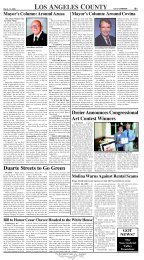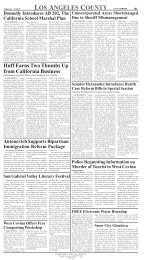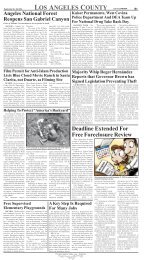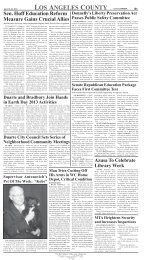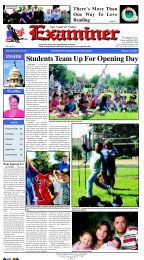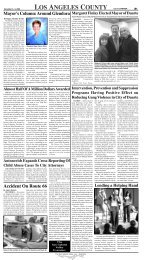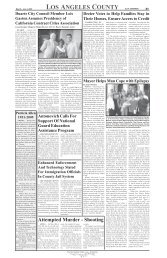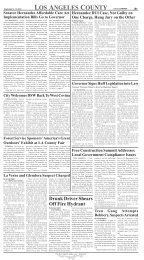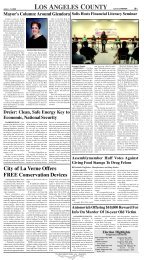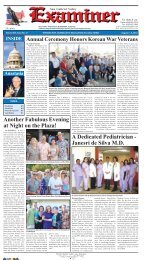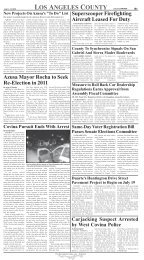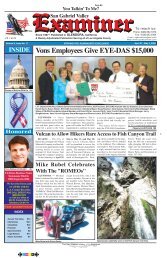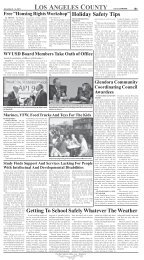B September 3 - 9 09 - San Gabriel Valley Examiner
B September 3 - 9 09 - San Gabriel Valley Examiner
B September 3 - 9 09 - San Gabriel Valley Examiner
You also want an ePaper? Increase the reach of your titles
YUMPU automatically turns print PDFs into web optimized ePapers that Google loves.
B4<br />
S.G.V. EXAMINER<br />
We Can See Clearly Now<br />
Recently our Federal Reserve<br />
Chairman, Ben Bernanke, stated<br />
he wanted (through policy<br />
transparency) to achieve three<br />
things as priority items for the<br />
Fed: he wanted to assure investors<br />
the Fed would take inflation<br />
seriously and remove<br />
stimulus in a timely manner, he<br />
wanted to reassure Congress<br />
the Fed would do whatever is<br />
necessary to help the economy<br />
recover, and he wanted to defend<br />
the Fed's independence in<br />
making monetary policy. What<br />
is interesting about his approach<br />
is new to Wall Street - he went<br />
directly to the Wall Street Journal<br />
in the form of an editorial<br />
titled, "The Fed's Exit Strategy."<br />
After Wall Street read this, there<br />
was no guessing where he was<br />
coming from - answers were<br />
provided concerning economic<br />
growth and the Fed's independence.<br />
His strategy was well<br />
received and deemed a success<br />
and will become a precedent for<br />
future communication from the<br />
Fed.<br />
This is a revolutionary step<br />
for the Fed. Recall Alan<br />
Greenspan's first experiment<br />
with transparency at the Fed<br />
was his decision to announce<br />
changes in the fed funds target.<br />
Before that, Wall Street had to<br />
guess. For the first five years<br />
of Greenspan's tenure, the<br />
FOMC never explicitly stated it<br />
was targeting the fed funds rate.<br />
Through the recent efforts of<br />
Bernanke, he achieved three<br />
things: 1/ Wall Street's first impression<br />
was the direct approach<br />
of the piece. It cut<br />
through all the guessing and<br />
averted the half-informed investor<br />
from speculating on the direction<br />
of the Fed's future monetary<br />
policy. 2/ By using the<br />
message in the Wall Street Journal,<br />
he did not have to use the<br />
FOMC minutes to communicate<br />
the exit strategy, which<br />
might have been a mistake because<br />
the appearance of a policy<br />
change in the minutes usually<br />
means the policy change is imminent.<br />
3/ He diverted any surprises<br />
not only to Wall Street,<br />
but also to Congress prior to his<br />
periodic Humphrey-Hawkins<br />
testimony.<br />
In past articles I have discussed<br />
the Fed's monetary<br />
policy now that the fed funds<br />
target is zero - after all, where<br />
are interest rate to go when at<br />
zero? Quantitative easing is the<br />
WE FILE AND<br />
PUBLISH YOUR<br />
D.B.A.<br />
or F.N.S.<br />
(Doing Business As or<br />
Ficticious Name Statement)<br />
CALL<br />
626-852-3374<br />
In A Nutshell<br />
What’s up in the Economy?<br />
KEN HERMAN<br />
Economic Analyst<br />
Glendora Councilman<br />
answer when the Fed is still trying<br />
to be in an accommodative<br />
mode in their approach to monetary<br />
policy. The Fed's focus is<br />
to put money into circulation<br />
through the direct purchase of<br />
Treasury and Federal Agency<br />
purchases, thus keeping interest<br />
rates low. But, what is their<br />
exit strategy from this technique?<br />
Wall Street has yet to see<br />
any motion and they worry<br />
about the remarkable expansion<br />
of reserves on the Fed's balance<br />
sheet in the past year, assuming<br />
reserve growth translates<br />
into money supply growth and<br />
inflation.<br />
But surprisingly Federal Reserve<br />
data shows money supply<br />
growth has slowed considerably<br />
since the start of the year<br />
and the rate at which money<br />
turns over has also slowed dramatically.<br />
As a result, monetary<br />
policy is already far less accommodative<br />
than it was at the end<br />
of last year.<br />
Still, the argument on Wall<br />
Street remains - at some point<br />
the economy will recover (and<br />
it probably already has), and<br />
when it officially does, the Fed<br />
must tighten through raising interest<br />
rates. Based on what we<br />
already know from Bernanke's<br />
testimony, here is what we can<br />
expect: 1/ The first step is job<br />
growth. This is at the top of the<br />
Fed's list of priorities. One that<br />
starts, we will see a change in<br />
direct monetary policy. 2/ The<br />
Fed is waiting for sustainable<br />
growth and job growth before<br />
raising interest rates. The Fed<br />
was originally fearful that they<br />
perhaps eased too aggressively<br />
and we would be faced with a<br />
very rapid recovery; this fear<br />
could translate into inflationary<br />
concerns, this has not happened,<br />
yet. 3/ As the Fed raises<br />
the funds rate, they will monitor<br />
the level of bank reserves.<br />
Reserves should fall naturally as<br />
banks no longer need the Fed's<br />
liquidity programs and as the<br />
Fed's investment portfolio matures.<br />
The effect Bernanke had on<br />
the capital markets is no surprise<br />
- interest rates throughout<br />
the curve dropped. One reason<br />
for the yield drop is the sensibility<br />
of the plan. Fed officials<br />
spent a great deal of time thinking<br />
about how to unwind their<br />
aggressive 2008 easing. Perhaps<br />
the most important was the<br />
FINANCIAL/CONSUMER<br />
Fed's intention to hold the mortgages,<br />
agencies and Treasuries<br />
purchased this year and last until<br />
they mature. This takes a substantial<br />
debt supply that would<br />
normally need to be financed<br />
from coming to market.<br />
For now, Wall Street expects<br />
the first tightening to begin next<br />
June, at which time job growth<br />
should be positive again. Interest<br />
rates should remain low as<br />
the Fed continues their asset<br />
purchases through the end of<br />
the year and perhaps through the<br />
first quarter 2010. Perhaps the<br />
best news is the forecast for the<br />
inflationary outlook - concerns<br />
have clearly subsided on Wall<br />
Street which insures Fed policy<br />
will remain unchanged for the<br />
foreseeable future.<br />
IN THE NEWS -<br />
BERNANKE REAPPOINTED:<br />
President Obama has reappointed<br />
Ben Bernanke as Fed<br />
Chairman, citing "his background,<br />
his temperament, his<br />
courage, and his creativity."<br />
Bernanke's term ends in February,<br />
so the President has saved<br />
us from half a year of needless<br />
speculation by making the announcement.<br />
The most important positive<br />
for investors is that Bernanke<br />
is a known entity. The Fed must<br />
raise rates and shrink reserves<br />
at some point, and the process<br />
is much easier to predict with a<br />
familiar Fed Chairman than it<br />
would be with someone new at<br />
the helm. Predictability of Fed<br />
policy will promote market stability.<br />
Bernanke made a few mistakes<br />
in his first term, but he<br />
learned from them, getting better<br />
as he went along. In the process<br />
he grew confident and<br />
strong. In his first year,<br />
Bernanke was nervous and uninformed<br />
during testimony. He<br />
looked weak as regional Fed<br />
Presidents undercut him in the<br />
press. In early testimony he<br />
proved woefully uninformed<br />
about the extent of the mortgage<br />
crisis and the regulatory needs<br />
of the financial system as a<br />
whole.<br />
But it was Bernanke who figured<br />
out how to contain the fallout<br />
from the collapse of Bear<br />
Stearns. Bernanke also recognized<br />
the need for liquidity in the<br />
banking system and found a legal<br />
way to get it done. He saved<br />
large non bank lenders like GE<br />
from being pulled down by the<br />
credit crisis and he became a<br />
voice of calm and reason in the<br />
financial storm. By October of<br />
last year he had become the vital<br />
center of the policy response<br />
to the global credit crunch.<br />
LIVE LOCAL, SHOP LO-<br />
CAL - THIS IS THE TIME<br />
OUR MERCHANTS NEED US<br />
I welcome your questions and<br />
c o m m e n t s :<br />
kenherman46@hotmail.com<br />
We missed the Cash-for-<br />
Clunkers program. Will there<br />
be another one?<br />
I don't know, but it there is,<br />
please think twice before taking<br />
advantage of this government<br />
offer. Sure it's nice to<br />
have a new car, but the new<br />
payments and higher automobile<br />
premiums are not so nice.<br />
Often times the folks who<br />
qualify for the cash for clunkers<br />
program don't qualify for a<br />
low-interest auto loan. So, just<br />
like the sub-prime mortgage<br />
loans, this government program<br />
encourages folks to buy a car<br />
that they really cannot afford.<br />
Temporarily, this program<br />
helped the auto industry by creating<br />
a demand for vehicles.<br />
However, what happens to the<br />
lenders and dealers who end up<br />
repossessing thousands of<br />
cars? Hey, if you wait a year<br />
or two, you might be able to<br />
pick one up at auction!<br />
We overspent during the<br />
summer - mini-vacations,<br />
movies - enjoying summer<br />
with the kids. Now all the<br />
back-to-school expenses are<br />
hitting us: new clothes, new<br />
shoes, new backpacks, pens,<br />
pencils, paper, books, gym<br />
uniform, band uniform, instruments,<br />
school photos, etc.<br />
How can we regain control?<br />
As I've said before, ask<br />
yourself whether this purchase<br />
is a NEED, or a WANT. Start<br />
with a budget and a list. Set<br />
limits, and prepare to say, "No."<br />
If your children are still growing,<br />
don't buy a whole year's<br />
wardrobe. And, while you're<br />
making a budget and a list, start<br />
saving for Halloween and<br />
Christmas.<br />
We want to 'count the cost'<br />
before jumping into buying<br />
our first home. We have<br />
enough saved up for a 10 percent<br />
down payment on a house<br />
as long as the price is $250,000<br />
or less. We have great credit,<br />
too. What else should we plan<br />
for?<br />
What an exciting, yet scary,<br />
event - buying your first home!<br />
You've done well to have saved<br />
and have great credit, too. Initially,<br />
additional expenses can<br />
include the 'good faith deposit'<br />
and a home inspection. A good<br />
realtor will guide you with the<br />
wording in the contract so that<br />
you don't risk losing your good<br />
faith deposit. The home inspection<br />
can run around $400 and<br />
up, depending on the size of the<br />
house, but it's well worth it!<br />
You'll have closing costs, and<br />
the expenses to move in, and<br />
any decorating/refurbishing<br />
costs. Often, especially for first-<br />
Haircuts<br />
Flat Tops $2.00 extra<br />
Razor Fades $2.00 extra<br />
WE SHAVE AROUND<br />
THE EARS WITH A<br />
STRAIGHT RAZOR<br />
AND<br />
WARM LATHER AND<br />
FINISH WITH A<br />
REFRESHING TONIC!<br />
Azusa/Glendora<br />
1159 E. Alosta Ave.,<br />
Azusa, CA 91702<br />
(Inside Stater Bros.<br />
Shopping Center<br />
at Barranca and Alosta)<br />
(626) 335-5593<br />
Monday-Thursday 9:00am - 6:00pm<br />
Friday 8:00am - 6:00pm<br />
Saturday 8:00am-4pm Closed Sunday<br />
The <strong>San</strong> <strong>Gabriel</strong> <strong>Valley</strong> <strong>Examiner</strong><br />
Julia Yoder<br />
time home buyers, the property<br />
tax and insurance are added to<br />
your monthly mortgage payment.<br />
It's important to include<br />
the expense of utilities - gas,<br />
electric, water, and trash. Ask<br />
for the seller or the Realtor to<br />
gift you with a 1-year homewarranty<br />
insurance policy, too.<br />
How do I figure how much<br />
life insurance to get, and<br />
should I get term, or wholelife?<br />
To calculate how much insurance<br />
you'll need, estimate<br />
how much your heirs will need<br />
to maintain their lifestyle without<br />
you. Don't forget to include<br />
additional costs they may face<br />
in your absence. If you've got<br />
young children, for example,<br />
include rising costs for<br />
childcare and higher education.<br />
Add up all other sources of income:<br />
spouse's salary, pension,<br />
Social Security, or, if eligible,<br />
any other government benefits.<br />
Check out<br />
www.WiseInvestorsNetwork.com,<br />
for helpful insurance and financial<br />
planning calculators. In<br />
general, if you currently earn<br />
$50,000 annually and purchase<br />
5 times your annual income<br />
with a $250,000 policy, your<br />
heirs should be able to safely<br />
withdraw 5% annually from the<br />
earnings, or $12,500 per year.<br />
Is that going to be enough?<br />
When it comes to deciding what<br />
type of life insurance to get,<br />
you need to look at the advantages<br />
and disadvantages of<br />
each. Although term insurance<br />
is typically less expensive than<br />
whole-life insurance, it's best to<br />
get quotes for both. The drawback<br />
of term life insurance is<br />
that it expires at the end of the<br />
term selected. However, nowadays<br />
there are 'return-of-premium'<br />
term life insurance policies.<br />
Although these cost<br />
roughly one-third more than<br />
plain term life insurance, when<br />
you're still alive at the end of<br />
the term, you get a refund of<br />
almost all the premiums you've<br />
paid. Whole-life insurance, on<br />
the other hand, might cost a little<br />
more than term life insurance,<br />
but it does not expire as long as<br />
<strong>September</strong> 3 - 9, 20<strong>09</strong><br />
you continue to pay your premiums.<br />
And, if you want to be<br />
covered for life, but don't want<br />
to pay premiums for life, you<br />
can obtain a quote which calculates<br />
the premiums to a certain<br />
age. Whole life insurance<br />
can build up a cash value, accessible<br />
during your lifetime.<br />
There are several types of life<br />
insurance policies that potentially<br />
build up a cash value. My<br />
clients really like Equity Indexed<br />
Universal Life insurance because<br />
of it's potential for greater<br />
growth, and ease of access to<br />
funds.<br />
I've always paid my mortgage<br />
on time. I just received a<br />
Notice of Default and the letter<br />
from the bank sounds like<br />
they are about to take my<br />
house! I've faithfully paid my<br />
mortgage payment, but I<br />
haven't paid this year's property<br />
tax yet. Don't I have 3<br />
years to pay my property tax<br />
before they take my home?<br />
The County Tax Assessor<br />
gives you several years to be in<br />
arrears on your property taxes<br />
before they sell your home in a<br />
tax sale. However, the mortgage<br />
loan company is different.<br />
Look carefully at your copy of<br />
your loan documents, and you'll<br />
probably find a section that talks<br />
about the various circumstances<br />
the lender will start<br />
making demands. One of those<br />
circumstances is typically unpaid<br />
property tax. First, communicate<br />
with your lender, but<br />
don't expect them to be very<br />
understanding. Don't wait; take<br />
action today -- put the money<br />
together and pay your property<br />
taxes.<br />
Got any other money-making<br />
ideas, or saving money<br />
ideas?<br />
Go online to:<br />
www.deals.zurvita.biz. Watch<br />
the videos, decide whether you<br />
want to be a representative, or<br />
just take advantage of the<br />
money-saving offers (land and<br />
cell phone plans, discount shopping,<br />
legal services, home warranty,<br />
and more).<br />
Got a question? Ask Julia<br />
by email or phone.<br />
Julia Yoder is a licensed Servicing<br />
Agent for individual,<br />
family, and senior finances and<br />
insurance, a licensed Realtor, a<br />
Sr. Loan Officer, and Notary.<br />
www.WiseInvestorsNetwork.com<br />
and www.YoderKnows.com 1-<br />
877-802-8569 or (626) 625-<br />
5221, or juliayoder<br />
@WiseInvestorsNetwork.com<br />
(CA Insurance Lic.#0C83859)<br />
Member of the National Ethics<br />
Bureau<br />
An Interview With Assemblyman Adams<br />
During a recent guest appearance<br />
on "Jeff & Virginia<br />
in the Morning,"<br />
KSGVRadio.com's morning<br />
show, Assemblyman Anthony<br />
Adams answered questions on<br />
a variety of topics.<br />
The show began with Assemblyman<br />
Adam's explaining<br />
the duties of an assemblyman<br />
and the diversity of the 59th<br />
Jeff of the Morning Show, Assemblyman Adams & Virginia of the<br />
Morning Show and Bob Kuhn, former Mayor of Glendora and President<br />
of the Board of Directors of the Three <strong>Valley</strong> Water District.<br />
District, which he represents.<br />
The show then covered an array<br />
of topics including prisons,<br />
the State budget crisis, water<br />
issues, gun control and, most<br />
importantly, the reasons he<br />
thought voting for the last budget<br />
was the only way to "keep<br />
California alive."<br />
Bob Kuhn, President of the<br />
Board of Directors for Three<br />
<strong>Valley</strong>'s Water District participated<br />
in the interview at every<br />
stage, and was especially helpful<br />
with regard to water issues.<br />
The overall tone of the show<br />
was non-threatening and positive.<br />
Assemblyman Adams is<br />
anxious to be a guest on future<br />
shows and welcomes every<br />
opportunity to keep his constituents<br />
informed.<br />
Jeff of "Jeff & Virginia in<br />
the Morning" stated, "It was a<br />
great show. I found Assemblyman<br />
Adams to be not only<br />
friendly and knowledgeable,<br />
but extremely genuine.<br />
If you would like to hear a<br />
replay of the show you can log<br />
on to KSGVRADIO.com and<br />
push play on the media player<br />
on the home page where it<br />
says Anthony Adams interview.



